冀教版英语七年级下册课件Lesson
Lesson2课件冀教版英语七年级下册
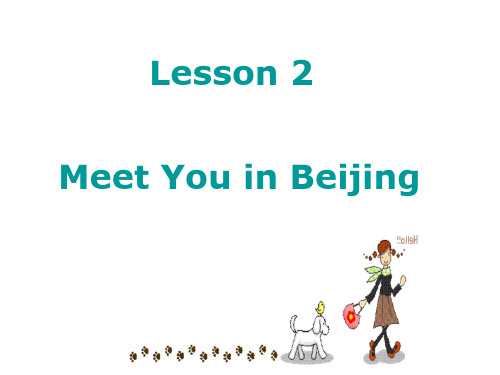
You will not/won’t learn about China.
Will I learn about China?
Yes,you will. / No, you won’t.
5. Arrive in Beijing. 到达某地arrive in(大地点)/at(小地点) = get to = reach+sp. They will arrive at the park in five minutes. When will they arrive in Shanghai?
We don’t __h_a_v_e_ e_n_o_u__gh _t_im__e_ to see red leaves. 3. 你的旅行计划是什么?
What is the _p_la_n__ __f_o_r__ your trip? 4. 我们将在火车站接他们。
We __w_i_ll_ _m__e_e_t _ _th_e_m__ at the railway station.
Can you say these numbers?
1 114
one thousand one
hundred (and) fourteen
6 500 five hundred
six thousand (and)
Language points
1.How exciting (it is)!感叹句
How happy (the boy is) !=What a happy boy (he is)! 请翻译:多聪明的一个孩子啊!多有用的书啊! How clever the boy is!=What a clever boy he is! What a useful book it is!= How useful the book is!
冀教版英语七年级下Unit1 Lesson1课件(共31张PPT)

5. - _____ D you ______ free tomorrow? - No. I ___ free the day after tomorrow. A. Are; going to; will B. Are; going to be; will C. Are; going to; will be D. Are; going to be; will be 6. Mother ________ me a nice present B on my next birthday. A. will gives B. will give C. gives D. give
动词send,take和give在同一类型句子中 表示不同意思。 I shall send the book to him tomorrow. 我会在明天把这本书(托人捎或从邮局 寄)给他(自己并不去)。 I shall take the book to him tomorrow. 我会在明天把这本书送到他那里(自己 拿去)。
12/29/2018
3. He ________ very busy this week, he D ________ free next week. A. will be; is B. is; is C. will be; will be D. is; will be 4. There ________ a dolphin show in D the zoo tomorrow evening. A. was B. is going to have C. will have D. is going to be
她能学习到中国历史。
What do we learn about Tony from the
冀教版七下英语精品课件unit 1 A Trip to the Silk Road Lesson 6
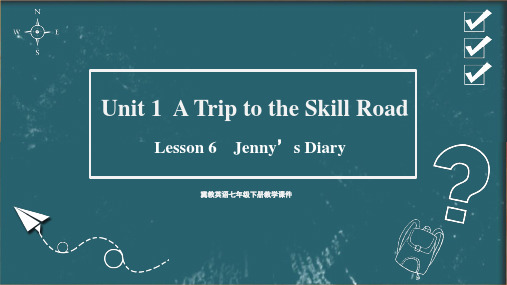
04 Text
Yesterday was a great day. In the afternoon, we went to the Great Wall. It is amazing! It is about 6 300 kilometres long and over 2 000 years old. Then, in the evening, we went to the Bird’s Nest. It is only a few years old, but it is a very famous and beautiful building. It held the 2008 Olympics. Danny looked for birds there. But of course — he didn’t find any.
B. eraser
C. instrument
D. singer
三0、7 按E要xer求cis完es
可表示近期将来的某一天,意为“改 another day 天”,也可表示从过去来看将来的某一动作或状态延续的“
又一天”。
one day
意为“有一天,终有一天”,既可用于过去时,也可用于将 来时。用于将来时相当于someday。
06 Let's Do It!
1 What places did Jenny and her friends visit on their trip? Listen and tick the correct pictures.
冀教版七年级英语下册Unit-2-Lesson-8课件(共16张PPT)
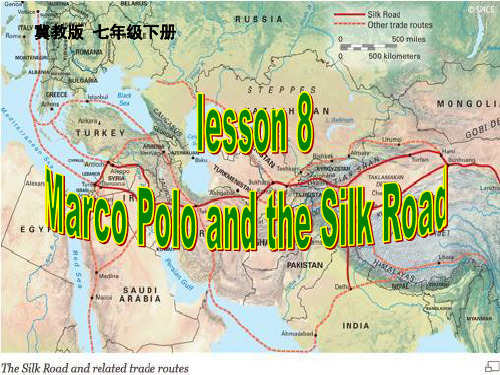
Let’s Do It 1
Listening Listen and fill in the blanks.
1. At the age of _____, Marco Polo went to China. 2. Marco Polo and his father moved goods between _____ and _____ on the Silk Road. 3. Marco Polo learned about _____ and _____ in China.
ride - rode
fall - fell
eat - ate
Let’s Do It 3
Fill in the blanks with the correct forms of the words in the box.
hope
1. 2. 3. 4.
coal
journey
discover
goods
The Chinese discovered coal and invented paper.
other adj.
Marco Polo also brought back much silk, tea and other goods.
hope n.& v.
I hope to travel all over the world someday.
Homework
Find and write down interesting facts about a famous character.
Work in groups.What do you know about Marco Polo? Find more information about him and present it to the class. Task tips:
冀教版七年级下册unit-1-lesson1-6名师公开课获奖课件百校联赛一等奖课件
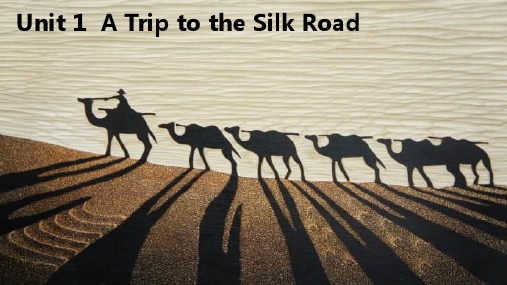
Some student from my class will go to China and travel on the Silk Road. May I go with them? will:一般将来时态 Who will lead the trip? 特殊疑问句 Ms. Martin! Here is the note from my school. 倒装语序there be 句型 (Jenny’s father and mother read the note.) read旳过去式过去分词是一样旳 note用作可数名词,意为“信笺、笔记”。 (1).make \ take notes 意为“做笔记”。 (2).leave sb. a note 意为“给某人留便条”。 Yes, you may go. This is a good chance for you. You will learn about China. 一般将来时态 learn about Really? Great! Thanks, Mum and Dad! I ‘m so excited! I will send Li Ming an e-mail and tell him the good news. (1).send及物动词,“寄,送”,过去式为sent。 send sb. sth.= send sth. to sb.意为“把某物寄给某人” (2).tell sb. sth.= tell sth. to sb. 意为“告诉某人某事” news是不可数名词,意为“新闻、消息”。可用piece表达其数量,例如: “一则新闻” a piece of news。 “两则新闻” two pieces of news。
with:很主要旳介词 1. 具有;带有 having;carrying The girl with long hair is my sister.那个留长发旳姑娘是我妹妹 注意:with ,about ,和in均可表达特征和属性. With表达属于人和物旳明显特点;about表达附属于人或物不可捉摸旳旳特点; In表达附属与人或物旳内部固有特点. 2. 用;使用(工具、手段等) word that shows what you are using He was writing with a pencil. 他在用铅笔写字。 注意:(1). “With+东西”表达行为旳主体一般是人把该物体看成工具来使用 “by+东西” 表达并非 “人”而是该“东西”才是行为旳主体 (2).with跟使用旳工具;In跟使用旳材料。同步使用工具和材料使用with. May I write with a pencil我能够用铅笔写吗 3. 与…一道;跟…一起 word that shows things or people are together Robert is playing with his friend. 罗伯特跟他旳朋友在一起玩。 4. 在…一边;与…一致;拥护 on the same side; agreeing I agree with you. 我同意你旳意见。 5. …对…;与…对垒 against She was angry with me. 她生我旳气。 6. 因为;因为 because of (这种语义旳with多半与表达情绪旳词连用 She was red with anger .她愤怒旳张红了脸 7. (表达行为、方式)以…;带着 word that shows how something happens,how you do something,etc. He spoke with anger. 他愤怒地说。
冀教版七下英语精品课件unit 1 A Trip to the Silk Road Lesson 5
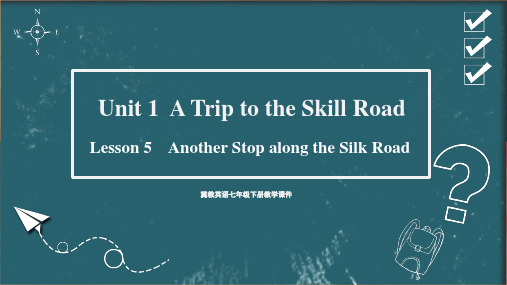
02 Lead in
Look and say
The group arrives in Dunhuang. This is an amazing city. It’s one of the main stops on the Silk Road.
02 Lead in
There is the Mogao Caves in the City of Sands. They can’t believe it ! They are walking on the same road as Marco Polo.
05 Language points
1. They take a tour around the city. take a tour 意为“参观,旅游”。其中tour在此作名词,意为“旅
行,旅游”。 如:Do you want to take a tour around Xi'an?
你想环游西安吗?
同义。
闻名于世。
05 Language points
短语
释义
用法
例句
be famous for
因为…… 而出名
for后面接出名的原 This place is famous for
因,与be known for its cotton. 此地因棉花
同义。
而出名。
This singer is famous to
04 Text
Listen and read.
The group arrives in Dunhuang. They take a tour around the city. Ms. Martin: This is an amazing city.
冀教版英语七年级下册全册优质课件(衔三起)
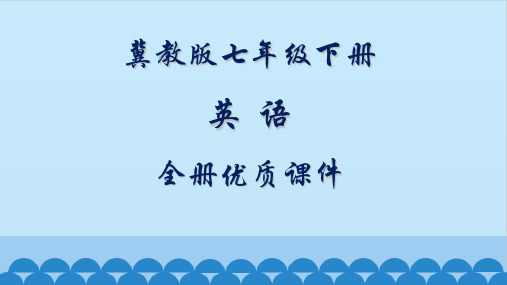
注意:在上述结构中,当“直物” 为代词it或them时,只能使用加介词to 或for的结构。
把它给我:send it to me ( V )
send me it (X )
给我买它:buy it for me( V ) buy me it (X )
三、课堂检测
单项选择
( D)1.Can you give_____.
过程与方法:
自主学习 合作探究 讨论练习
重点: 掌握并运用一般将来时。 难点: 掌握并运用一般将来时 知识链接: 了解丝绸之路。
(一)轮阅读做题目。词汇学习
1. Here is a good _c_h_a_n_c_e__(机会) for you. 2. _T_h_e_S_i_lk__R_o_a_d_____(丝绸之路) has a long history.
2. 丝绸之路 The Silk Road
3.旅行
go on a trip to =take a trip to
4.制定……的计划 make a plan for
5.带/引某人去某地 lead…to…
6. 给某人留便条 leave sb. a note
7.有做……的机会 have a chance to do sth. =have a chance of doing sth.
A. me it
B. it me
探究三:My school is planning a trip around China. 我们学校正计划周游中国的旅行。
⑤Mom will buy some apples. (变否定句) Mom won’t buy any apples .
①“旅行”辨析:trip 侧重短途旅行; travel 泛指旅行的过程,尤其指出国等长途 旅行。
冀教版七年级下册英语精品教学课件Lesson 41 Were People Healthy Then

4. Work in pairs. Life was different a long time ago. Talk about the differences between life then and life now.
【例句】 I often fish at weekends. 周末我经常去钓鱼。 I bought two fish yesterday. 昨天我买了两条鱼。 I like fish very much. 我非常喜欢鱼肉。
2. At that time, there were no supermarkets. (教材P106)
➢ To be able to talk about health.
nation n. 国家;民族 hunt v. 打猎;搜索 spend v. 用(钱);花(钱)
natural adj. 自然的;天然的
First Nations refers to the indigenous(当地的;本土的) people of a country, especially in Canada or Australia.
Language Points
1. Dena Morin and her grandfather, Mr. Morin, are fishing at the lake. (教材P106)
fish v. 钓鱼
fish作名词时, 意为“鱼; 鱼肉”, 当“鱼”讲时是可数名词, 指鱼的 条数时单复数同形; 指鱼的种类时复数是fishes; 指“鱼肉”时是 不可数名词。
- 1、下载文档前请自行甄别文档内容的完整性,平台不提供额外的编辑、内容补充、找答案等附加服务。
- 2、"仅部分预览"的文档,不可在线预览部分如存在完整性等问题,可反馈申请退款(可完整预览的文档不适用该条件!)。
- 3、如文档侵犯您的权益,请联系客服反馈,我们会尽快为您处理(人工客服工作时间:9:00-18:30)。
冀教版英语七年级下册课件Lesson
冀教版英语七年级下册 Lesson 42教案Lesson 42 教学设计LESSON OBJECTIVESAfter this lesson, students should be able to1. understand the meaning of the text2. remember and use the mastery vocabulary and know some important words for describing travels3. write something about making a trip4. understand and write down some missing words as heard in sentences or passages in different contextsCLASS OPENING(5 MINUTES)For ideas and tips on beginning a class, see “Teaching Techniques” at the back of this teacher's guide.
STUDENT BOOK(15 MINUTES)There is one reading for this lesson. The reading presents new vocabulary and reviews the vocabulary students have learned in previous lessons.
The new vocabulary for this lesson includes the following words and phrases:
Mastery VocabularyGood-bye! (Bye-bye! Bye! )Have a nice/good tripOral VocabularyThere is no new oral vocabulary in this lesson.
There are many ways to teach immersion reading. Here are some step-by-step instructions for one way to teach the reading in this lesson.
Step l: Check to see if the class has previewed the text as required. In either case, ask the students to read the text silently now, since it contains many new words and idiomatic expressions about traveling to scenic spots. Select one or two sentences containing key words or phrases and ask if anyone has figured out the meaning. If a student replies correctly, ask him or her to share the strategies used to puzzle out the meanings. Remember to give lots of praise for a good try, even if it's wrong.
Step 2: Play the audiotape. Have the class follow the audiotape while looking at the text.
Step 3: Divide the class into small groups. Ask the class,“If Jenny, Brian and Danny visited all the places and enjoyed everything as advertised, what did they do?”In answer to this question, each group will make a chart of all Jenny's, Brian's and Danny's activities, based upon the reading.
Step 4: If time allows, have one or two groups share what they have written with the rest of the class.
CTIVCLASS ITY: WHERE ARE YOU GOING? 15 MIUTES)In this activity, the students work in groups to generate clues to a mystery location, and then solve each other's puzzles. Here are some step-by-step instructions:
Explain to the class that Niagara Falls (described in the student book
for this lesson) is a famous place to visit in Canada. If you gave a list of clues about this destination to a Canadian, he or she would know it right away!
Divide the class into small groups. Ask each group to choose a famous destination for a trip in China. Each group then generates a list of clues about this destination-in -English!-for another group to guess.
Tell the students that the list of clues should include:
--What people enjoy doing there. --How people travel there (plane, train, car)。
--Where the place is, in a general way (in the north, south, east or west of China)。
--Any other clues the students can put into English.
The students exchange clues with another group and find the answer to the other group's clues.
If you have time, the groups can exchange clues with more than one group.
CTIVITY BOOK (5 MINUTES)Play the audiotape. The aural exercises for this lesson are:
1. Listen to the audiotape. Fill in the blanks. Write the words you hear.
MaryMary works at a bank. She begins her work at eight o'clock in the morning. She stops working at five o'clock in the afternoon.
At five o'clock, the bank closes. All the people who work in the bank leave. Some people drive to their houses. Some people take the bus. Some people take the train.
Mary walks to her house. She likes to walk. She walks and walks. She lives eight kilometers from the bank. She walks for three hours.
At eight o'clock in the evening, Mary is at her house. She eats supper. At ten o'clock she goes to bed. Mary is tired. She is eighty years old.
CLASS CLOSING (5 MINI ITES)Below is the suggested homework for this lesson.
Aim to give students about thirty minutes of homework. Use your discretion ill deciding how much reading or how many exercises to assign as homework. Base your decision on students' progress.
the second reading in the readerthe remaining activity book exercisesthe next lesson in the student book。
